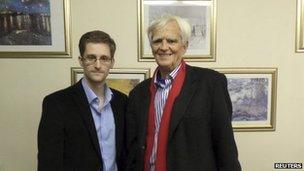Brazil and Germany draft anti-spy resolution at UN
- Published
A summary of US spying allegations brought about by Edward Snowden's leak of classified documents
Germany and Brazil have asked the UN General Assembly to adopt a draft resolution calling for the right to privacy in the digital age.
The draft calls for an end to excessive electronic surveillance, noting that the illegal collection of personal data "constitutes a highly intrusive act".
Brazil and Germany have both been angered by allegations of large-scale US surveillance.
The allegations stem from revelations by US whistleblower Edward Snowden.
'Deeply concerned'
The draft resolution, which does not name individual countries, will be debated by a General Assembly committee focusing on human rights.
The draft calls on the 193-member assembly to declare that it is "deeply concerned at human rights violations and abuses that may result from the conduct of any surveillance of communications".
This includes "extraterritorial surveillance of communications, their interception, as well as the collection of personal data, in particular massive surveillance, interception and data collection".
The resolution, which will be voted on later this month, calls on all countries to protect the right to privacy guaranteed under international law.
While General Assembly resolutions are non-binding, they can carry significant moral and political weight if they win enough support.
The draft follows allegations that the US has been eavesdropping on foreign leaders, including Brazilian President Dilma Rousseff and German Chancellor Angela Merkel, angering US allies in Europe and Asia.
Disclosures about the extent of US spying activity came from documents leaked to media organisations by former National Security Agency (NSA) contractor Edward Snowden.
The German government earlier said it was keen to speak directly to Mr Snowden about US surveillance activities, after it was revealed the NSA had been bugging Mrs Merkel's mobile phone for years.
Mr Snowden had earlier met German Green MP Hans-Christian Stroebele in Moscow and expressed his readiness to brief the German government on NSA spying.
His lawyers said any meeting with German investigators would take place in Moscow, not Germany.
The German chancellor's anxiety about US spying overshadowed last week's EU summit, when she remarked with irritation that spying on friends is "really not on".
Ms Rousseff was angered by revelations that the NSA had hacked the computer network of Brazil's state-run oil company Petrobras to collect data on emails and telephone calls.

Mr Stroebele (right) met Mr Snowden at a secret location in Moscow
US Secretary of State John Kerry acknowledged on Friday that in some cases, US spying had gone too far.
He said he would work with President Barack Obama to prevent further inappropriate actions by the NSA.
Mr Snowden, 30, fled to Russia in June after leaking details of far-reaching US telephone and internet espionage. He has temporary asylum, allowing him to live in Russia, until July 2014.
Mr Snowden's lawyer said his client had started work on Friday for a major private website in Russia but did not disclose which site, citing security concerns.
The scale of the alleged US espionage has provoked international concern and calls for tighter supervision.
Asian countries have also protested at claims that Australia was involved in a US-led spy network, with Indonesia summoning the Australian ambassador to Jakarta.